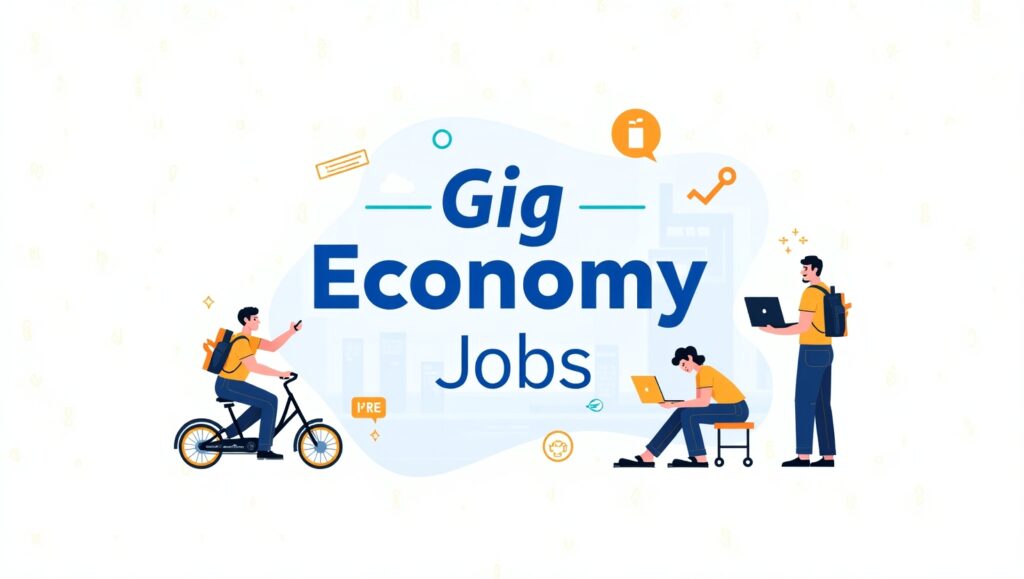
Introduction
Technology advancements, together with demands for more flexible work conditions and economic shifts, are creating a seismic transformation within the modern workforce. The gig economy forms the core of this workforce transformation because independent workers engage in short-term projects without committing to permanent employers. Freelancer gig workers form a rapidly expanding component of today’s labor market.
This article examines the freelancer gig worker identity, outlines gig work fundamentals while exploring various gig economy positions, and discusses both benefits and obstacles of this new employment model. Through detailed examples and case studies supported by current data, you will achieve a comprehensive understanding of how this evolving work environment affects both professionals and businesses.
What Is a Freelancer Gig Worker? (Revealed: What Is a Freelancer Gig Worker and Why It’s a Game-Changer)
Defining a Freelancer and a Gig Worker
An independent professional called a freelancer delivers services to clients on a project-based arrangement. Freelancers provide services through writing projects as well as web development assignments and offer additional consulting and marketing expertise. Freelancers usually provide services to more than one client and send them their invoices as payment requests.

People who work as gig workers complete short-term on-demand tasks such as delivering food items, transporting passengers, or constructing furniture pieces. Uber, TaskRabbit, and DoorDash operate as platforms that typically support the work they enable.
A freelancer gig worker combines both traits. As independent contractors, workers perform short-term assignments in both digital and physical service sectors. Freelancer gig workers consistently use online platforms to secure various work assignments and develop multiple client relationships. While this combination provides great flexibility, it demands strong skills in time management and financial planning.
Freelancer gig workers who work independently also focus on developing their brands through online marketing efforts. Freelancer gig workers establish trust with potential clients by using referrals and testimonials alongside social proof to attract business.
How Freelancer Gigs Differ from Traditional Jobs
Traditional jobs require employees to work fixed hours while providing them with a salary and benefits, including healthcare coverage and paid time off, along with retirement savings options. Standard employment positions generally remain confined to specific geographical locations and established corporate structures.
Freelancer gigs, however, are contract-based. Freelancers earn their income based on projects completed or tasks performed and enjoy the autonomy to select their workload while working from any location. Freelancers operate without a central office or managerial oversight while creating their work schedules.
That said, with this freedom comes responsibility. Without employer support gig workers are responsible for managing their tax payments as well as obtaining health insurance and establishing retirement plans. Gig workers manage their marketing efforts alongside sales activities and customer service responsibilities.
Real-Life Example: Jane, a Freelance Writer
Jane left her corporate job in 2020 to begin working as a freelancer on Upwork. Her initial projects were small writing assignments which she completed with consistent quality earning positive reviews and establishing her reputation. Since Jane launched her freelancing career she made twice her former full-time job salary within one year. As a freelancer she produces blog content for tech startups while working remotely and traveling. Freelancers reach success by combining their commitment with specialized expertise and effective marketing strategies.
What Is a Gig? Understanding the Core of the Gig Economy
Gig Work Meaning Explained
Gig work represents short-term, flexible employment opportunities where workers receive payment after completing designated tasks. Gig tasks range from basic activities like package delivery to advanced projects such as marketing campaign development. Gig work lacks long-term obligations or benefits while being primarily organized through digital platforms.

Gig work attracts workers because of its flexible nature. Employees choose gigs that match their available time and abilities while employers gain access to a workforce they can adjust according to business requirements. Both parties benefit from this model because it fills labor shortages as they happen.
Independent work engages nearly 70 million Americans who make up over 36% of the workforce, as reported by McKinsey. Analysts predict those numbers will climb as we move forward.
Types of Gigs in the Freelancer Market
Gig work is not limited to any one sector. It spans across industries, including:
- Digital Gigs: Freelance work includes content writing and graphic design as well as video editing and virtual assistance, together with coding.
- Physical Gigs: Food delivery, ridesharing, housekeeping, landscaping, moving services.
- Hybrid Gigs: Hybrid gigs like online tutoring mix digital sessions with face-to-face consultations.
Freelancer gig workers choose digital gigs exclusively to achieve location independence while some choose to combine different categories in their work to create a diverse income stream.
Popular Platforms for Gig Work
| Platform | Type of Work | User Base | Revenue (Latest) |
| Upwork | Writing, design, dev | 18+ million | $618 million |
| Fiverr | Creative & digital gigs | 4.2 million | $361 million |
| TaskRabbit | Physical tasks, repairs | 1 million | Private company |
| Uber | Ride-sharing | 3.5 million | $31.8 billion |
| DoorDash | Food delivery | 2 million | $8.6 billion |
These platforms serve as intermediaries, enabling gig workers to connect with clients and provide payment protection and reputation-building reviews.
What are gig economy jobs, and what are their operational principles?
Characteristics of Gig Economy Jobs
People who work in the gig economy need short-term contracts and self-employment status while remaining available whenever needed. Freelancers find these jobs on online platforms that connect them with clients who need particular services.

As independent contractors, gig economy workers must handle business operations like invoicing and tax filings on their while also managing marketing activities. These job roles enable professionals to establish client trust through service delivery rather than contractual employment.
Success in gig jobs requires workers to deliver fast results of high quality that satisfy their clients.
Why Gig Economy Jobs Are on the Rise
The gig economy shows fast expansion because of many different factors. Smartphones and high-speed internet availability support remote work possibilities. Workers increasingly seek flexible schedules. Businesses prefer the scalability of freelance talent.
Stat Alert: According to Statista’s 2023 report, the total earnings of the U.S. freelance workforce reached $1.27 trillion, while 36% of workers engaged in freelance work as either a part-time or full-time job.
Startups and large businesses choose to employ freelancers for specialized work such as web development and graphic design because this strategy reduces costs and speeds up project completion.
Who profits the most from working within the gig economy framework?
Gig work is ideal for workers who want to manage their work environment along with their income potential and schedule. It’s particularly attractive to:
- Students: Earn money while gaining professional experience through side employment opportunities.
- Parents: Balance childcare responsibilities with flexible work.
- Retirees: Supplement retirement income while staying active.
- Professionals: Develop side businesses or pursue new career paths.
Freelancers thrive in gig work because they prefer dynamic projects over routine tasks.
Pros and Cons of Being a Freelancer or Gig Worker

The Power Benefits of Gig Work
The gig lifestyle brings compelling advantages. The varied tasks and flexible nature of gig work help many workers regain their professional excitement. Freelancers enjoy the privilege of choosing their clients along with the ability to work from any location while setting their own schedule and income possibilities.
The gig environment enables entrepreneurs to test business ideas through rapid skill improvement and industry connections before launching full-time ventures.
The Downsides You Should Know
Gig work presents several limitations that need consideration. Income can be inconsistent. There are no employer benefits. Working independently requires strong self-discipline and effective time management, while also presenting the challenge of social isolation. Without proper boundaries, high stress levels can result from uncertain workflows along with challenging clients.
Effective strategies for freelance gig workers to achieve success.
- Build a compelling and updated portfolio.
- By focusing on a specific niche market, you can increase demand while gaining the ability to charge premium rates.
- Keep your workflow structure organized by using tools like Trello, Notion, or QuickBooks.
- Develop connections actively by engaging on LinkedIn and attending networking events.
- Establish client agreements to protect against scope creep and payment disputes.
Case Study: Rahul, a Freelance Web Developer
After losing his job during the pandemic, Rahul decided to begin his freelancing career. He attended online courses to enhance his WordPress and SEO knowledge. Rahul used LinkedIn to secure international clients, which enabled him to make over $100,000 annually. By delivering consistent high-quality work and building a strategic network of referrals, he managed to establish his freelance business to last for two years.
The Future of Freelancer Gig Workers in the Gig Economy

Trends Shaping the Gig Economy
The implementation of AI and automation technology enables freelancers to focus on creative tasks by handling repetitive work. Freelancers can now work together with worldwide teams thanks to remote collaboration tools. Platforms designed for freelancers’ benefits are starting to offer solutions for healthcare and retirement needs.
Additional platforms have begun offering services that include freelancer education resources as well as performance tracking capabilities and client-freelancer matchmaking services.
Will Gig Work Replace Traditional Employment?
Gig work is becoming a mainstream career path despite full-time positions currently holding dominance. Freelancing has become the preferred way to work in tech, design, and content professions.
Stat Spotlight: Stat Spotlight: Intuit predicts that more than 80% of big businesses will depend on freelance workers as essential parts of their teams by 2030.
Legislative bodies are modifying existing laws to provide gig workers with job protections that match those given to regular employees.
Strategies for maintaining competitiveness in the freelance marketplace.
Learn continuously. Build a strong personal brand. Prioritize client relationships. Manage your time wisely. Implementing these actions will enable you to differentiate yourself and maintain success in the expanding gig economy.
Thriving in this evolving space requires consistent work quality combined with clear communication and high client satisfaction.
Conclusion
The gig economy has evolved from being a marginal concept to becoming a central force that is transforming how work operates in the future. Modern gig workers create profitable careers that offer flexibility and meaning while matching today’s digital lifestyle trends.
To successfully earn extra money or become a full-time freelancer, you need to understand what being a freelance gig worker entails and how the gig economy functions.
When you adopt the right mindset and employ suitable tools and strategies you can turn gig work into a fulfilling career path instead of just a job.

